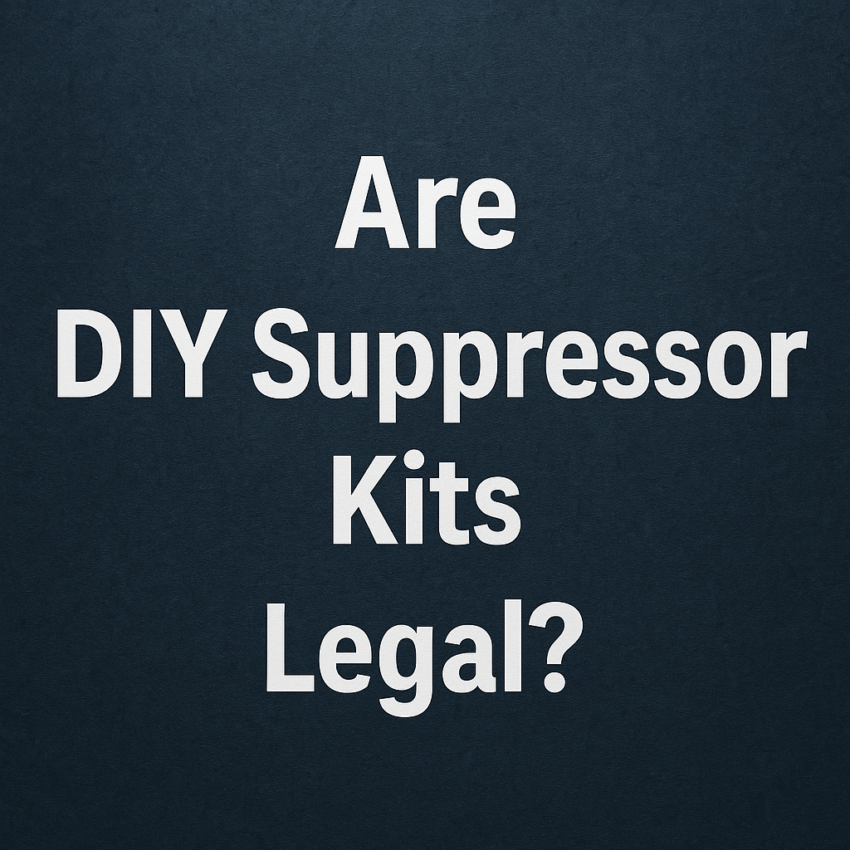If you’re considering building your own firearm suppressor, the first question that likely comes to mind is: Are DIY suppressor kits legal? The short answer is yes, but with strict regulations. Suppressors (also called silencers) are regulated under U.S. federal law, and creating your own requires compliance with the National Firearms Act (NFA). Violating these laws can result in hefty fines and prison time, so understanding the legalities before proceeding is crucial.
Understanding Suppressor Laws in the U.S.
Suppressors fall under the National Firearms Act (NFA) of 1934, which means their manufacturing, sale, and ownership are subject to federal oversight. Unlike regular firearm parts, suppressors require registration with the Bureau of Alcohol, Tobacco, Firearms and Explosives (ATF). Here’s what that means for DIY suppressor kits:
- You can legally build a suppressor, but you must register it with the ATF.
- A Form 1 (Application to Make and Register a Firearm) must be submitted and approved before starting the build.
- A $200 tax stamp is required per suppressor.
- Engraving requirements must be met, including serial numbers and owner information.
Failure to comply can lead to up to 10 years in prison and fines of $250,000 per violation.
Federal vs. State Laws
Even if federal law allows you to make your own suppressor, state laws vary. Some states impose additional restrictions, while others outright ban suppressors. Here’s a breakdown:
- Legal in most states: Texas, Florida, Arizona, and others allow suppressors with ATF approval.
- Restricted states: California, New York, Illinois, and New Jersey have outright bans or severe restrictions.
- No federal tax stamp required? Some states, like Texas, have attempted laws that challenge federal oversight, but these are legally uncertain.
Before considering a DIY suppressor kit, check both federal and state laws to avoid legal trouble.
What Is a DIY Suppressor Kit?
A DIY suppressor kit typically includes components like baffles, tubes, and end caps that are meant to reduce firearm noise. These kits may be marketed as “solvent traps” or “fuel filters,” but the ATF considers any device designed or intended for firearm suppression to be a suppressor. That means:
- Purchasing a kit without an approved Form 1 can be illegal.
- Modifying everyday items (like flashlights or oil filters) into suppressors is a federal crime unless properly registered.
- Even possessing certain unassembled parts can be considered “constructive intent” by the ATF, leading to legal consequences.
How to Legally Build a DIY Suppressor
If you want to legally build a suppressor, follow these five essential steps:
- Submit an ATF Form 1 – Apply online or via mail, detailing your intent to manufacture a suppressor.
- Pay the $200 tax stamp – This is required for every suppressor you make.
- Wait for ATF approval – This can take several months, so patience is key.
- Engrave the suppressor – Federal law mandates engraving with your name, location, and serial number.
- Assemble legally – Once approved, you can construct your suppressor using legal parts and methods.
Skipping any step in this process makes your suppressor illegal and can lead to severe penalties.
Common Myths About DIY Suppressors
Many misconceptions surround DIY suppressor legality. Let’s clear up some of the biggest myths:
- “I can buy a solvent trap and turn it into a suppressor without registration.” ❌ False – Doing this without a Form 1 is a federal crime.
- “3D-printed suppressors are legal without ATF approval.” ❌ False – Even homemade suppressors must be registered.
- “If I don’t assemble the suppressor, I can legally own the parts.” ⚠️ Partially true – Possession of certain parts may indicate “constructive intent,” leading to legal trouble.
Penalties for Illegal Suppressor Possession
Possessing an unregistered suppressor is a serious federal offense. If caught, you may face:
- Up to 10 years in federal prison
- A $250,000 fine per violation
- Permanent loss of firearm rights
- Possible ATF raids and confiscation of all firearms
These penalties apply whether you knowingly or unknowingly violated the law, making compliance non-negotiable.
Conclusion
So, are DIY suppressor kits legal? Yes, but only if you follow the law to the letter. Building a suppressor requires ATF approval, a tax stamp, and strict adherence to federal regulations. While some states allow more flexibility, others impose complete bans, making it essential to check your local laws. If you’re serious about building your own suppressor, take the legal route—anything else could cost you your freedom.
Want to stay updated on firearm laws? Bookmark this page and subscribe to our newsletter for the latest legal insights.
